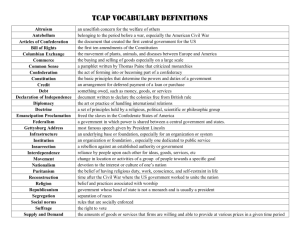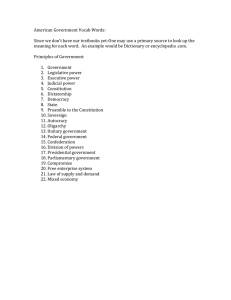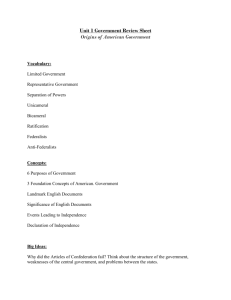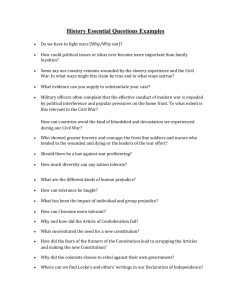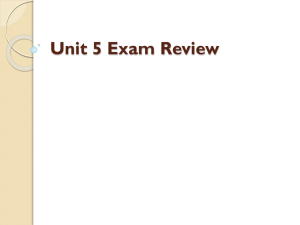Georgia Constitution and The Articles of Confederations
advertisement
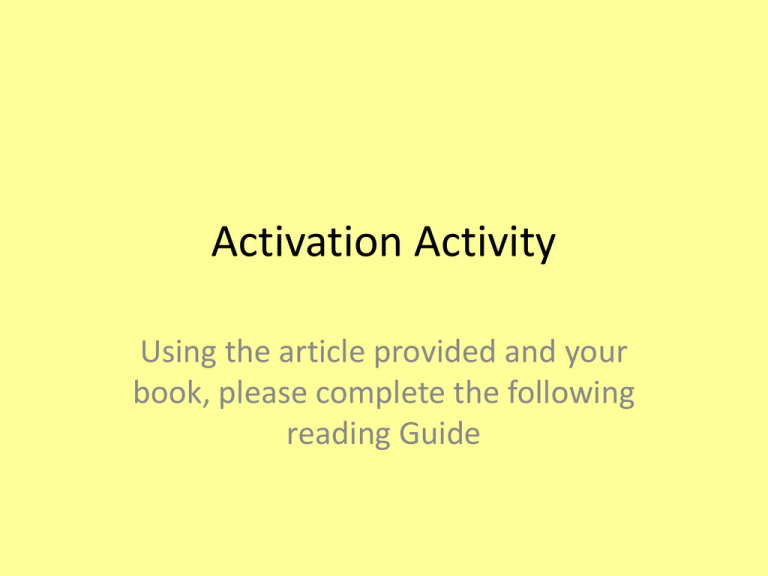
Activation Activity Using the article provided and your book, please complete the following reading Guide Write 5 facts or four or more words about the Articles of Confederation or the Georgia Constitution of 1777 F I R S T T R Y Georgia Constitution and The Articles of Confederations Standards • The student will describe the impact of events that led to the ratification of the United States Constitution and Bill of Rights a) Analyze the strengths and weaknesses of both the Georgia Constitution of 1777 and the Articles of Confederation and explain how weaknesses in the Articles of Confederation led to a need to revise the Articles b) Describe the role of Georgia at the Constitutional Convention of 1787; include the role of Abraham Baldwin and William Few, and reasons why Georgia ratified the new constitution. Word Review • Ratify- To approve or make valid • Unicameral - Consisting of a single branch, chamber or house, as a legislative assembly. • Bicameral - having two branches, chambers, or houses, as a legislative body. • Confederation - local/state governments make their own laws. A weak overlying central government. Lesson Three (SS8H4a) – The student will analyze the strengths and weaknesses of both the Georgia Constitution of 1777 and the Articles of Confederation and explain how weakness in the Articles of Confederation led to a need to revise the Articles. The Georgia Constitution of 1777: YOU CAN’T BEAT SOMETHING… WITH NOTHING… SS8H4 – The student will describe the impact of events that led to ratification of the United States Constitution and the Bill of Rights Lesson Three (SS8H4a) – The student will analyze the strengths and weaknesses of both the Georgia Constitution of 1777 and the Articles of Confederation and explain how weakness in the Articles of Confederation led to a need to revise the Articles. The Georgia Constitution of 1777: When Georgia declared their independence from England… …they had to replace English government with a government of their own. SS8H4 – The student will describe the impact of events that led to ratification of the United States Constitution and the Bill of Rights Lesson Three (SS8CG1b) – The student will explain the concepts of separation of powers and checks and balances. The Georgia Constitution of 1777: In creating a government, several important things must be remembered in order to protect a nation from tyranny!!! SS8CG1 – The student will describe the role of citizens under Georgia’s constitution. Lesson Three (SS8CG1b) – The student will explain the concepts of separation of powers and checks and balances. The Georgia Constitution of 1777: All governments must have three basic functions (responsibilities): A. The Legislative function –makes the law B. The Executive function – enforces or executes the law C. The Judicial function –interprets or explains the law SS8CG1 – The student will describe the role of citizens under Georgia’s constitution. Lesson Three (SS8CG1b) – The student will explain the concepts of separation of powers and checks and balances. The Georgia Constitution of 1777: 2. The three basic functions must be present and must be kept equally powerful. A. Without the legislative function, there would be no laws to interpret or to enforce. B. Without the executive function, laws could be written and understood, but could not be enforced. A LAW IS NOT A LAW UNLESS THEY HURT WHEN BROKEN!!! C. Without the judicial function, laws could be created but could not be explained in order to be enforced. SS8CG1 – The student will describe the role of citizens under Georgia’s constitution. Lesson Three (SS8CG1b) – The student will explain the concepts of separation of powers and checks and balances. The Georgia Constitution of 1777: 3. The three basic functions must be kept separate in order to keep one group or person from becoming too powerful. Hitler could make his own laws, interpret them however he pleased and enforce them against anyone who displeased him!!! SS8CG1 – The student will describe the role of citizens under Georgia’s constitution. Lesson Three (SS8CG1b) – The student will explain the concepts of separation of powers and checks and balances. The Georgia Constitution of 1777: 4. The fundamental laws of the government must be written down as a Constitution in order to create a written record of the rights of the people and the limits of the government’s power. SS8CG1 – The student will describe the role of citizens under Georgia’s constitution. Lesson Three (SS8CG1b) – The student will explain the concepts of separation of powers and checks and balances. The Georgia Constitution of 1777: 5. The people must have a higher law or Power to appeal to in case the government is ineffective or begins to abuse its power. 䇾We hold these truths to be self evident, that all men are created equal, that we are endowed by our Creator with certain inalienable rights… – Declaration of Independence SS8CG1 – The student will describe the role of citizens under Georgia’s constitution. Lesson Three (SS8H4a) – The student will analyze the strengths and weaknesses of both the Georgia Constitution of 1777 and the Articles of Confederation and explain how weakness in the Articles of Confederation led to a need to revise the Articles. The Georgia Constitution of 1777: In creating its new government, the leaders of Georgia did not want the executive function to be too powerful. After all, they did not want to remove one powerful executive, King George III, only to replace him with another. SS8H4 – The student will describe the impact of events that led to ratification of the United States Constitution and the Bill of Rights The Georgia Constitution of 1777 • 1777 – 1789 (12 years) • Based on the principles of the Declaration of Independence • Not capable of meeting the needs of governing the state. • Three Branches of Government Legislative • Unicameral, or one branch • Powers – Appoint members of the judicial and executive branch Executive Branch • Governor – Appointed by legislative branch – Limited to a ONE year term – Very little power Judicial Branch • All Courts • Legislature appointed the positions for this branch Freedoms of the People • Freedom of : – Press – Religion – Trial by jury • The people were not given the opportunity to ratify the constitution Lesson Three (SS8H4a) – The student will analyze the strengths and weaknesses of both the Georgia Constitution of 1777 and the Articles of Confederation and explain how weakness in the Articles of Confederation led to a need to revise the Articles. The Georgia Constitution of 1777: STRENGTHS 1. The Constitution of 1777 was written down. 2. The Constitution of 1777 separated the three basic functions. 3. The Constitution of 1777 protected basic rights. SS8H4 – The student will describe the impact of events that led to ratification of the United States Constitution and the Bill of Rights Lesson Three (SS8H4a) – The student will analyze the strengths and weaknesses of both the Georgia Constitution of 1777 and the Articles of Confederation and explain how weakness in the Articles of Confederation led to a need to revise the Articles. The Georgia Constitution of 1777: WEAKNESSES 1. The three functions were not equally powerful.Instead, the legislative branch was most powerful. 2. The governor was dependent entirely upon the legislature (who elected him and chose his council) and was in office for too short a period to be effective. 3. Since most Georgians had been Tories, the Constitution of 1777, written by Whigs, was never sent to the people for ratification (approval). SS8H4 – The student will describe the impact of events that led to ratification of the United States Constitution and the Bill of Rights Lesson Three (SS8H4a) – The student will analyze the strengths and weaknesses of both the Georgia Constitution of 1777 and the Articles of Confederation and explain how weakness in the Articles of Confederation led to a need to revise the Articles. The Articles of Confederation: Just as Georgia began to create its own state government, the 2nd Continental Congress drafted the Articles of Confederation as the first Constitution of a new national government. SS8H4 – The student will describe the impact of events that led to ratification of the United States Constitution and the Bill of Rights Lesson Three (SS8H4a) – The student will analyze the strengths and weaknesses of both the Georgia Constitution of 1777 and the Articles of Confederation and explain how weakness in the Articles of Confederation led to a need to revise the Articles. The Articles of Confederation: Just like the Georgians who wrote the Constitution of 1777, the members of the 2nd Continental Congress wanted to avoid creating a strong central government with a powerful executive like they experienced under British rule. SS8H4 – The student will describe the impact of events that led to ratification of the United States Constitution and the Bill of Rights Lesson Three (SS8H4a) – The student will analyze the strengths and weaknesses of both the Georgia Constitution of 1777 and the Articles of Confederation and explain how weakness in the Articles of Confederation led to a need to revise the Articles. The Articles of Confederation: • The Articles of Confederation, the first national constitution, went into effect on March 1, 1781. • It created a very weak national government. Each of the 13 states were considered separate, independent nations. • The national government was, essential, a loose confederacy, alliance, or friendship (similar to the United Nations). SS8H4 – The student will describe the impact of events that led to ratification of the United States Constitution and the Bill of Rights Articles of Confederation • 1776 – 1789 • America’s first constitution, but not the same as we have today • Provided a very WEAK central government • Due to experience Britain’s monarchy, so their goal was to give as much power as they could to the people through “autonomy” of the states. • Too many limitations caused the government not to function smoothly National Government’s Powers • Declare War • Coin Money • Establish post offices • Send and recall Ambassadors Did not have Power • Could not impose tax • Could not regulate the trade of goods between the states (states could put taxes on each other) Lesson Three (SS8H4a) – The student will analyze the strengths and weaknesses of both the Georgia Constitution of 1777 and the Articles of Confederation and explain how weakness in the Articles of Confederation led to a need to revise the Articles. The Articles of Confederation: STRENGTHS 1.The Articles of Confederation were written down. 2.The Articles of Confederation set up a representative form of government in which the representatives were elected by the citizens. SS8H4 – The student will describe the impact of events that led to ratification of the United States Constitution and the Bill of Rights Lesson Three (SS8H4a) – The student will analyze the strengths and weaknesses of both the Georgia Constitution of 1777 and the Articles of Confederation and explain how weakness in the Articles of Confederation led to a need to revise the Articles. The Articles of Confederation: WEAKNESSES 1. The Articles of Confederation only a created a legislative branch!!! 2. Congress could not levy taxes, leaving the country unable to pay debts or soldiers. 3. Congress could not regulate trade between the states, allowing trade wars to arise between the various states. SS8H4 – The student will describe the impact of events that led to ratification of the United States Constitution and the Bill of Rights Lesson Three (SS8H4a) – The student will analyze the strengths and weaknesses of both the Georgia Constitution of 1777 and the Articles of Confederation and explain how weakness in the Articles of Confederation led to a need to revise the Articles. The Articles of Confederation: WEAKNESSES 1. Congress could make laws, but had not executive ability to enforce them. 2. Under the Articles of Confederation, all decisions required the approval of 100% of the states. 3. Under the Articles of Confederation, all states received only one vote in Congress, regardless of the state’s size (ex., Rhode Island had as much say as New York!!!). SS8H4 – The student will describe the impact of events that led to ratification of the United States Constitution and the Bill of Rights Lesson Three (SS8H4a) – The student will analyze the strengths and weaknesses of both the Georgia Constitution of 1777 and the Articles of Confederation and explain how weakness in the Articles of Confederation led to a need to revise the Articles. The Articles of Confederation: WEAKNESSES 7. Congress could not raise an army without the states’ permission, leaving the nation defenseless. The inability of Congress to respond to Shay’s Rebellion in 1786 threatened the safety of Massachusetts and demonstrated that the Articles of Confederation were unable to perform the most basic task of government… …defense!!!! SS8H4 – The student will describe the impact of events that led to ratification of the United States Constitution and the Bill of Rights Lesson Three (SS8H4a) – The student will analyze the strengths and weaknesses of both the Georgia Constitution of 1777 and the Articles of Confederation and explain how weakness in the Articles of Confederation led to a need to revise the Articles. The Articles of Confederation: SOMETHING HAD TO BE DONE!!! * Even George Washington, who normally kept his political opinions private, argued that the nation could not long survive under the Articles of Confederation. Video SS8H4 – The student will describe the impact of events that led to ratification of the United States Constitution and the Bill of Rights Overall Weakness of the AOC • • • • • • Strong legislative branch No Executive branch No Judicial branch Each state had its own currency All 13 states had to approve a law for it to pass ONE vote per state no matter the size of the population • Video QUICK QUIZ! THE ARTICLES OF CONFEDERATION Under the Articles of Confederation, a President would lead the country. True False Under the Articles of Confederation, states would be independent. True False The Articles of Confederation were easy to change. True False Under the Articles, states with more people got more votes in Congress. True False Under the Articles, Congress did not have the power to collect taxes. True False Under the Articles, Congress could pass laws and force states to follow them. True False The Articles of Confederation created the first American government. True False
